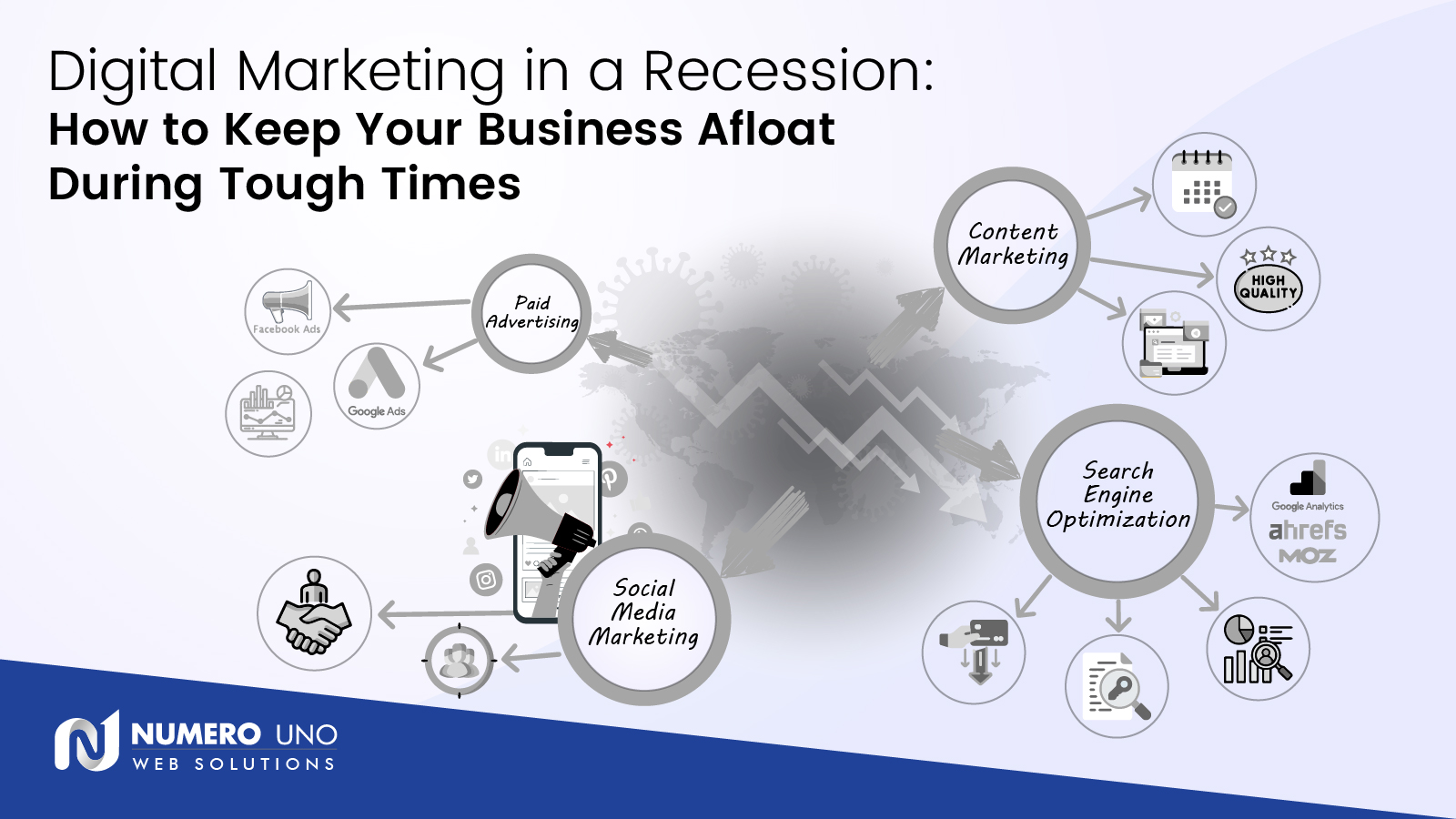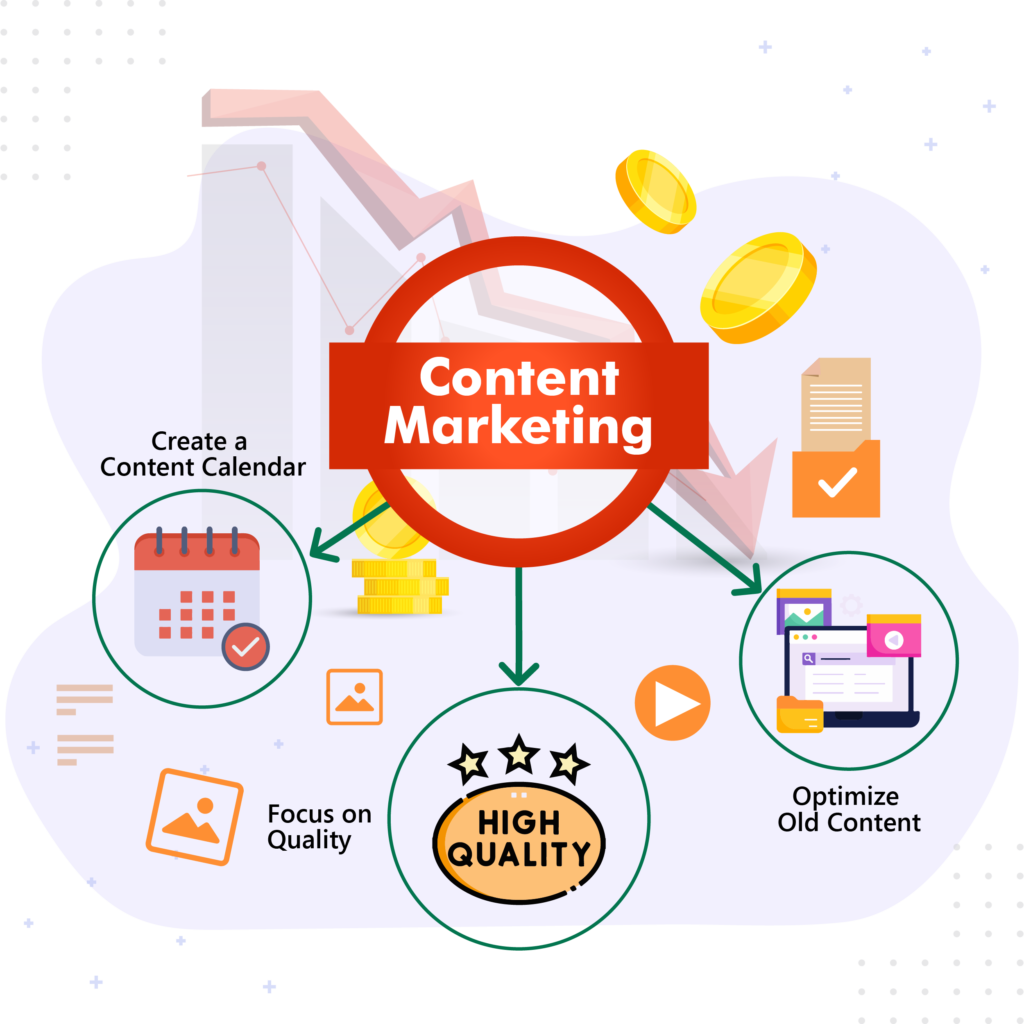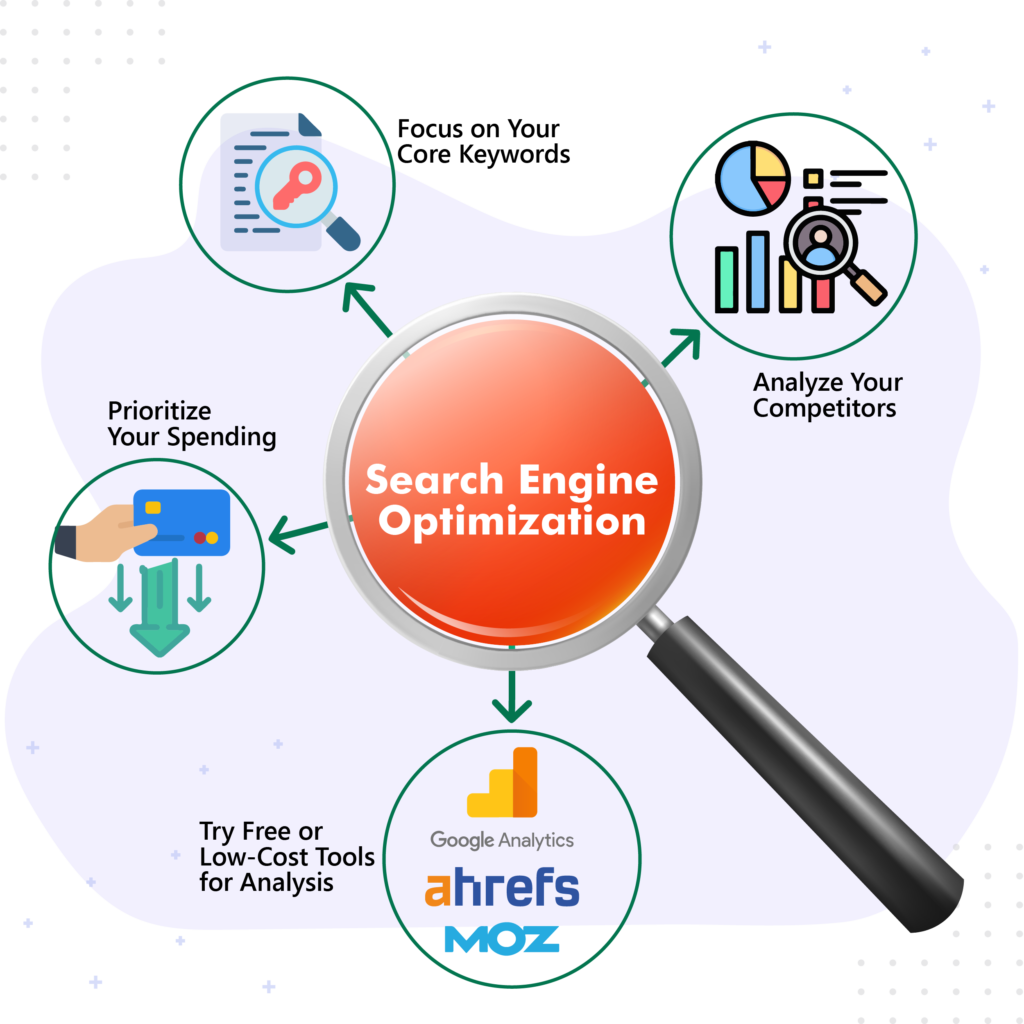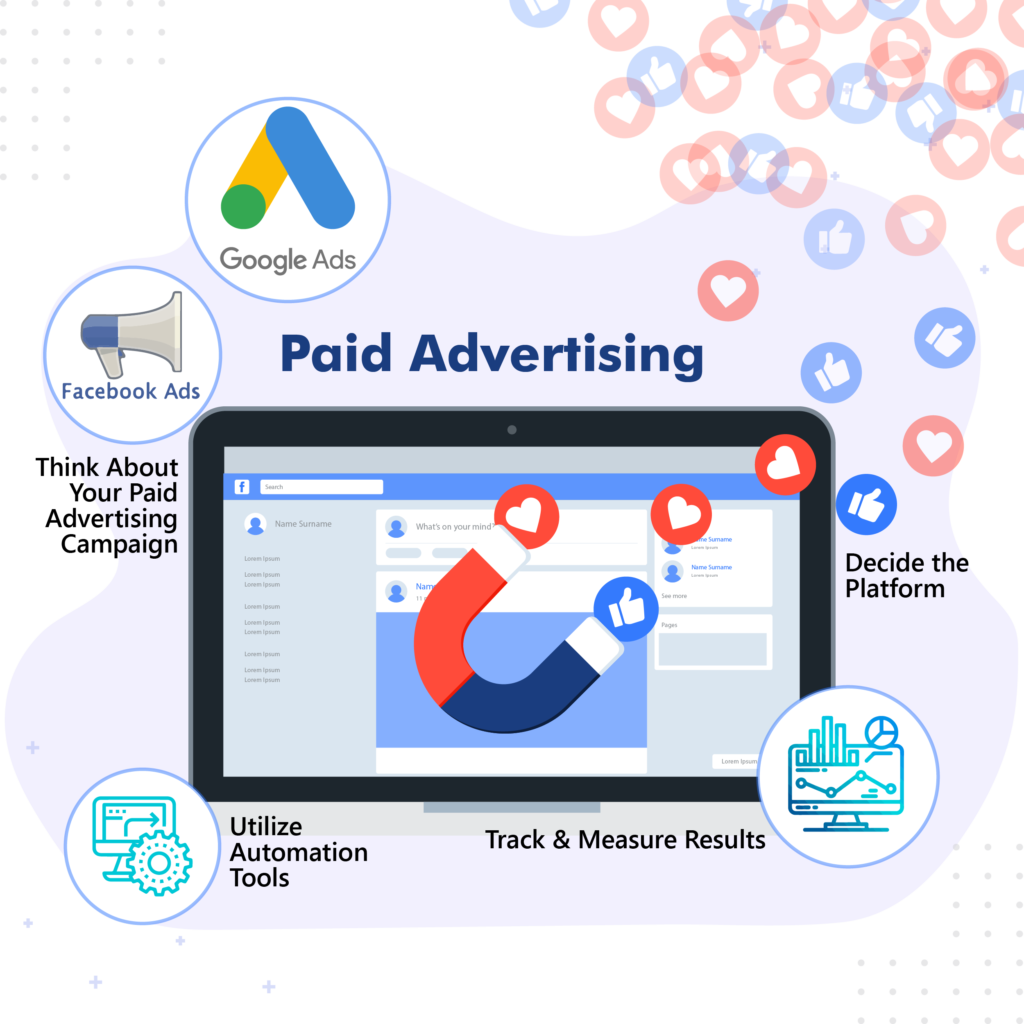
Marketing during a recession can be difficult, but it is essential to the success of your business. Even in tough times, there are plenty of opportunities to build customer loyalty and attract new leads. If we’ve learned anything from past recessions like the 2001 dot-com bubble, the 2008/2009 credit crunch, and the recent COVID-induced recession, it’s how to minimize the damage to your business.
Although each recession is unique, we can often predict human behaviour and reactions. Digital marketing provides flexible and creative solutions to help weather the upcoming storm.
Why Should You NOT Stop Digital Marketing During a Recession?
The first consumer reaction to a slow down and/or inflation is usually to reduce spending. Therefore, your target audience will be more mindful of their finances. Digital marketing can be useful for finding potential customers in new target markets and understanding customer spending trends.
Even though we can’t always predict how customers will act, we know that their habits change over time. If companies don’t listen to these changes, they might lose out on possible chances for growth.
The businesses that did well during the pandemic were the ones who quickly changed their plans to focus on online services and fast delivery. Fine dining restaurants started doing takeout orders while smaller shops focused on investing in e-commerce platforms. These businesses didn’t stop despite feeling threatened by the uncharted territory. In fact, they often found new audiences who are now loyal customers providing a steady income stream.
No matter how difficult 2023 might be for businesses, we cannot afford to think short-term. Although it may be appealing to slash marketing budgets, a decline in brand recognition will make bouncing back more complicated when the economy improves. Making sure each “marketing” penny is well-spent during a rough patch is vital.
Furthermore, digital marketing can help you generate leads, build loyalty and trust, enhance customer experience and engagement, and improve your overall visibility. It also allows you to stay one step ahead of the competition.
How to Create Recession-Proof Digital Marketing Strategies and Plans
Creating a recession-proof digital marketing plan requires mindful planning and budgeting. Digital marketing methods such as content marketing, SEO, social media marketing and email campaigns can help you save money while effectively reaching potential customers.
Here are some tips and strategies you can use to make sure your marketing doesn’t suffer in an economic downturn:
Content Marketing During a Recession

Content marketing is an important part of any digital strategy, even during a recession. Focus on creating high-quality content that provides value to your customers and builds loyalty. Make sure that your content is relevant to current events and trends, and don’t forget to optimize your content with SEO best practices in order to maximize reach.
Check out the following tips to create a great content marketing plan during the recession:
- Create a Content Calendar: Creating a content calendar helps you plan and organize your digital marketing efforts. It also allows you to track the success of your campaigns, identify areas of improvement, and adjust your strategy when needed.
- Focus on Quality: When it comes to digital marketing, it’s important to focus on quality over quantity. Quality content and compelling visuals are essential for getting your message across and generating interest in your business.
- Optimize Old Content: With the new Google helpful content update, it is very important to analyze all the old content that you added to your website. A recession is a good time to update, remove, and optimize content to ensure it is SEO friendly. You can reduce your budget for creating new content and concentrate more on optimizing old content.
Search Engine Optimization

SEO is a great way to get more visibility online and attract potential customers. Even during economic downtimes, SEO is a cost-effective marketing strategy that can help your business grow (or at least stay afloat). SEO tactics such as keyword research, content optimization, and link building can help you get to the top of the search engine rankings and attract more attention from potential customers.
But how can you ensure that your SEO does not suffer during this recession? Here are some tips to ensure your success.
- Prioritize Your Spending: Prioritize the activities that will have the most impact on your bottom line and focus on those first. Digital marketing campaigns should also be regularly evaluated in order to ensure that they are delivering results. With a limited marketing budget, it is very important to focus on your core products and services to get better leads and sales.
- Focus on Your Core Keywords: When it comes to SEO, focus on the core keywords that your business is known for. Doing keyword research and optimizing your content around those keywords can help you rank better in the search engine results pages (SERPs).
- Analyze Your Competitors: During a recession, it is important to analyze your competitors and understand their strategies. This will help you identify new opportunities to get ahead of the competition and find areas where you can improve your SEO efforts.
- Try Free or Low-Cost Tools for Analysis: Digital marketing is data-driven, so it’s important to have the right tools in place to track and analyze your campaigns. There are a number of free or low-cost tools available such as Google Analytics, Google Search Console, ahrefs, or Moz that can help you measure the success of your campaigns and make informed decisions about where to allocate resources.
Social Media Marketing

Social media marketing is an effective way to reach out to potential customers and connect with them on a personal level. During the recession, it is important to create content that resonates with the audience and engages them in meaningful conversations. Social media can be used as an effective platform to share offers, discounts, and promotions for your products or services, as well as build relationships with customers.
Keep your social media marketing strategy afloat during a recession with these tips:
- Understand Your Target Audience: The key to successful social media campaigns is understanding your target audience and their preferences. Take the time to research the topics, interests, and pain points of your target demographics so that you can create content that resonates with them.
- Choose the Right Platforms: Social media is vast and there are a lot of platforms to choose from. Before investing in any social media platform, consider the demographics of your target audience and determine which platforms they are most active on.
- Engage with Your Customers: Use social media to engage with your customers and build relationships. Take the time to respond to comments, answer questions, and share valuable information that can help them make informed decisions.
- Keep a Watch on Social Media Trends: Monitor social media conversations related to your niche and industry. Understanding the trending topics can help you create content that is relevant and resonates with your target audience.
Paid Advertising

Even during a recession, paid advertising can be an effective way to reach more customers and generate more leads. Digital marketing tools such as Google Ads, Facebook Ads, Twitter Ads and LinkedIn Ads can be used to target specific audiences and tailor your ads to reach them.
When done strategically, paid advertising can help you get the most out of your digital marketing budget.
- Decide the Platform: Before launching your paid advertising campaigns, decide which platforms are going to be the most effective for you. Consider the demographics of your target audience and invest in the platforms that they are most active on.
- Think About Your Paid Advertising Campaign: Instead of frittering away your ad budget on ineffective ads, invest in targeted campaigns that will help you generate leads and sales. Remember to keep an eye on your ads’ performance and update them as necessary.
- Utilize Automation Tools: Utilizing automation tools can help you get the most out of your paid advertising campaigns. Invest in SEO and analytics tools such as Google Ads Automation and Facebook Ads Manager to optimize your campaigns.
- Track & Measure Results: Digital marketing is data-driven, so make sure to track and measure the success of your campaigns. Use tools such as Google Analytics to monitor the performance of your campaigns and make changes as necessary.
Outsource Your Digital Marketing Work
Digital marketing can be an overwhelming task. If you’re struggling to manage your campaigns or don’t have enough time to dedicate to digital marketing, consider outsourcing some of your work to a digital marketing agency. An experienced team can help you get better results from your campaigns and save you time and money.
How Numero Uno Web Solutions Can Help Your Small Business in a Recession
If you are a small business owner, there is no reason to panic during this recession. In fact, it may be the perfect time to invest in your company and make sure that you are doing everything possible to set yourself up for success when the economy rebounds.
Numero Uno Web Solutions can help you do just that. We are experts in SEO, web design, and online marketing, and we have a track record of helping businesses succeed even during tough times. Contact us today to learn more about how we can help you grow your online business.




